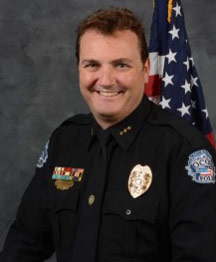Contact Us
To provide feedback on the Community Policing Dispatch, e-mail the editorial board at CPDispatch@usdoj.gov.
To obtain details on COPS Office programs, publications, and resources, contact the COPS Office Response Center at 800-421-6770 or AskCopsRC@usdoj.gov

U.S. Department of Justice
Office of Community Oriented Policing Services
Washington, DC 20530
 Deputy Chief McCosker joined the Ocoee Florida Police Department in 1992 and is a graduate of the prestigious FBI National Academy Session 271. He is currently a high liability and advance course instructor at Osceola County’s Police Academy.
Deputy Chief McCosker joined the Ocoee Florida Police Department in 1992 and is a graduate of the prestigious FBI National Academy Session 271. He is currently a high liability and advance course instructor at Osceola County’s Police Academy.
If you have been around law enforcement officers long enough, you will eventually pick up on the fact that they tend to be “hyper-vigilant.” When they go to a restaurant and ask for a good seat, the officers are usually not talking about the table with the best atmosphere. They are talking about the seat that puts their backs to the wall and provides them with a clear view of the entryways and cash register. If two officers are going to lunch at the same time, they debate about who gets the prized seat. As Deputy Chief of the Ocoee Florida Police Department, locating the “best seat” doesn’t stop at the restaurant. When I am at church, for example, I am in the back row, right up against the wall and next to the main entrance, with a full view of the pulpit and two side entrances.
There was a time when one might have said that so much focus on seating arrangements is a paranoid practice, but now that multiple church shootings have occurred in a relatively short period of time, it seems like a wise practice. It is an unfortunate sign of the times that the term “soft target” has a mainstream understanding. The fact of the matter is that almost every aspect of day-to-day life is conducted in a soft target environment. This simply means that we are conducting our activities in areas and places that are relatively unprotected or vulnerable to attacks. Our places of worship tend to be among the biggest areas at risk.
Since many churches do not perceive themselves at risk of crime, security measures are frequently minimal and inadequate. Church buildings are rarely designed with security as an important feature. In an effort to allow members of the congregations to come and go freely, access management is often not considered and the buildings may be unlocked and unoccupied for several hours. Key control management may not be as closely monitored as it should. Churches, by nature, may have the mission of ministering to parts of the population that have had a troubled past and may still be struggling with those issues. Unfortunately, some in our communities may pose concerns to the well-being of the church.
While the debates about gun control, mental health issues, drug addiction, domestic violence and terrorism run their course, we can start to take actions to “harden” our houses of worship to make them less desirable targets. We can all agree that it is close to impossible to decrease a criminal’s desire to commit a crime, but we do have the opportunity to decrease a criminal’s opportunity to victimize our churches. Larger centers of worship have the ability to hire private security and/or off-duty law enforcement. However, smaller congregations may not be able to shoulder the financial burden. It may be time to examine the role that current volunteers play at the church and start recruiting new volunteers to step up and be part of a “Church Watch Program.”
Church leaders are often highly educated in their field, but they may not have much experience in the area of grounds security. As law enforcement officers, it is important to reach out and partner with our local houses of worship and provide them with resources and ideas on how to start a “Church Watch,” or to improve the safety of their attending congregation and facilities. One of the first steps a church leader can take in establishing a Church Watch is to define participants’ roles. By simply assigning a volunteer to the parking area, you not only have a point of early alert to potential security issues, but you also have decreased the opportunity for a criminal to burglarize vehicles while church services are being conducted. Ushers, who frequently are assigned to entrance ways, can be trained on how to approach a suspicious person, alert others, and/or notify law enforcement of a potential need for assistance. Additionally, the same ushers can be trained on how to secure the building from a potential threat, or evacuate the building if necessary. These are just a few simple ideas that increase the safety of those attending church services.
Deputy Chief Stephen McCosker
“A Law Enforcement Journey”
Subscribe to Email Updates
To sign up for monthly updates or to access your subscriber preferences, please enter your email address in the Subscribe box.






